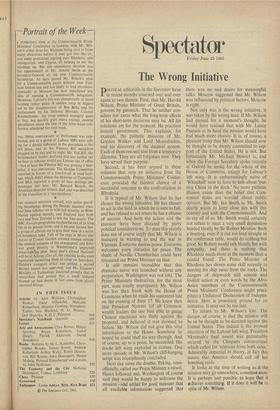The Wrong Initiative
POLITICAL editorials in the Spectator have in recent months returned over and over again to two themes. First, that Mr. Harold Wilson, Prime Minister of Great Britain, governs by gimmick. That he neither con- siders nor cares what the long-term effects of his short-term decisions may be. All his solutions are for the moment. He practises instant government. This explains, for example, the pathetic missions of Mr. Gordon Walker and Lord Mountbatten, and his discovery of the decimal system. Each of them rescued him from a temporary dilemma. They are all forgotten now They have served their purpose.
Second, it has been argued in these columns that only an initiative from the Commonwealth Prime Ministers' Confer- ence provided the faintest chance of a successful outcome to the confrontation in Rhodesia.
It is typical of Mr. Wilson that he has chosen the wrong initiative. He has chosen to act in the field in which he is sure to fail, and has refused to act where he has a chance of success. And both the action and the inaction have been dictated by party political considerations. To state this plainly does not of course imply that Mr. Wilson is insincere in wanting to end the war in Vietnam. Everyone desires peace. Everyone welcomes every initiative for: peace. The shade of Neville Chamberlain could have reassured our Prime Minister on that.
It still remains incredible that this dramatic move was launched without any preparation. Washington was not told. The Prime Ministers themselves, for the most part, were totally unprepared. Mr. Wilson was less than frank with the House of Commons when he made his statement-late on the evening of June 17. He knew then that President Nyerere (of all Common- wealth leaders the one best able to gauge Chinese reactions) was flatly against the proposal, and believed it was doomed to failure. Mr. Wilson did not give this vital information to the House. Somehow he hoped he could bluff his way through. And of course, up to a point, he succeeded. His docile left wing exploded in ecstasy. One more episode in Mr. Wilson's cliff-hanging script was triumphantly concluded. Next day came the doubts. Peking, semi- officially, called our Prime Minister a nitwit. Hanoi followed suit. Washington of course said they would be happy to welcome the mission—and added for good measure that all available information suggested, that there was no real desire for meaningful talks. Moscow suggested that Mr. Wilson was influenced by political factors. Moscow is right.
Not only was it the wrong initiative, it was taken by the wrong man. If Mr. Wilson had paused for a moment's thought, he would have realised that with Mr. Lester Pearson at its head the mission would have had much more chance. It is, of course, a pleasant irony that Mr. Wilson should now be thought to be deeply committed to sup- port of the United States. He is not. But fortunately Mr. Michael Stewart is, and when the Foreign Secretary spoke recently at Oxford he spoke for the whole of the House of Commons, except for Labour's left wing. It is embarrassingly naïve of `Whitehall' now to have to talk about 'put- ting China in the dock.' No more pathetic illusion exists than the belief that Com- munist states are worried about public opinion. But Mr. Ian Smith is. Mr. Smith dearly wants to keep close ties with this country and with the Commonwealth. And so say all of us. Mr. Smith would certainly not refuse to meet a very small deputation headed ideally by Sir Robert Menzies. Such a meeting, even if it did not lead straight to the conference table, would do nothing but good. Sir Robert would talk bluntly but with sympathy, and there is nothing, that Rhodesia needs more at the moment than a candid friend. The Prime Minister of Rhodesia has shown some skill recently in steering his ship away from the rocks. The dangers of shipwreck still remain and foolish action or even words by the Afro- Asian members of the Commonwealth Prime Ministers' Conference might preci- pitate a Unilateral Declaration of Indepen- dence. Here is promising ground for an initiative. It may not be too late.
To return to Mr. Wilson's kite. The danger, of course, is that the mission will be or be thought to be directed against the United States. This indeed is the avowed intention of the Labour left wing. President Nkrumah's final assent was presumably secured by the Chequers communiqué which called for 'restraint from both sides.'
Admirably impartial in theory, in fact this means that America should call off her bombing raids.
It looks at the time of writing as if the mission may go somewhere, sometime soon.
It is perhaps just possible to hope that it achieves something. If it does it will be in spite of Mr. Wilson.






































 Previous page
Previous page